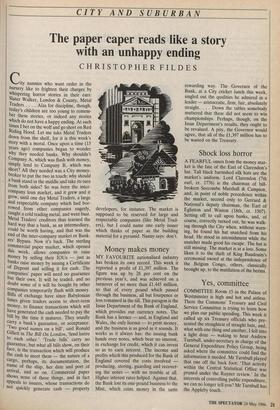CITY AND SUBURBAN
The paper caper reads like a story with an unhappy ending
CHRISTOPHER FILDES
City nannies who want order in the nursery like to frighten their charges by whispering horror stories in their ears: Slater Walker, London & County, Metal Traders . . . . Alas for discipline, though, today's children are too young to remem- ber these stories, or indeed any stories which do not have a happy ending. At such times I bet on the wolf and go short on Red Riding Hood. Let me take Metal Traders down from the shelf, for it is this week's story with a moral. Once upon a time (15 years ago) companies began to wonder why they needed banks. Why shouldn't Company A, which was flush with money, simply lend to Company B, which was short? All they needed was a City money- broker to put the two in touch: why should a bank stand in the middle and take its turn from both sides? So was born the inter- company loan market, and it grew and it grew, until one day Metal Traders, a large, and respectable company which had bor- rowed from other companies eagerly, caught a cold trading metal, and went bust. Metal Traders' creditors thus learned the hard way that a bank, as an intermediary, could be worth having, and that was the end of the inter-company market or Bank- ers' Bypass. Now it's back. The sterling commercial paper market, which opened this week, allows companies to raise money by selling their IOUs — just as banks raise money by issuing a Certificate of Deposit and selling it for cash. The companies' paper will need no guarantee but their own. It will be traded, and no doubt some of it will be bought by other companies temporarily flush with money. Bills of exchange have since Babylonian times given traders access to short-term money, to finance transactions which will have generated the cash needed to pay the bill by the time it matures. They usually carry a bank's guarantee, or acceptance: 'Two good names on a bill', said Ronald Gillett in The Bill On London, 'lend lustre to each other.' Trade bills' carry no guarantee, but what all bills show, on their face, is the transaction which will produce the cash to meet them — the nature of a cargo, perhaps, its documentation, the name of the ship, her date and port of arrival, and so on. Commercial paper shows none of these things, and in fact appeals to issuers, whose transactions do not quickly generate cash — property developers, for instance. The market is supposed to be reserved for large and respectable companies (like Metal Trad- ers), but I could name one early issuer which thinks of paper as the building material for a pyramid. Nanny says: don't.














































 Previous page
Previous page